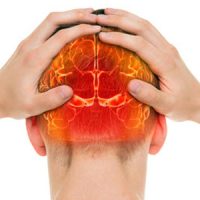Car Accident-Related Concussions

Often, when we hear people talking about concussions, it is in a sports injury context. This makes sense, as athletes like professional football, hockey, and soccer players experience brutal physical contact and so are more susceptible to serious brain injuries than the average person. What comes as a surprise to many people, however, is that most brain injuries stem not from sports accidents, but from car crashes. Of these head injuries, concussions are the most common.
What are Concussions?
A concussion is a type of head trauma that involves the disruption of normal brain functioning and often occurs as a result of blunt force impact. While concussions are technically categorized as mild traumatic brain injuries (TBIs), their effects are often anything but mild. Concussions can lead to an altering of mental status, consciousness, and memory, often for weeks or months after the injury occurred.
How Car Accidents Cause Concussions
Car accident-related concussions can be caused by striking one’s head on the steering wheel, window, dashboard, or even the headrest. Some, however, can occur when there is no impact to the head at all. Car crashes almost always involve a sudden impact and deceleration, which can result in the unexpected and extreme movement of the head whipping forward and backward. This movement can cause the brain to shift, even striking the inside of the skull itself. Even though the victim didn’t actually strike his or her head, this traumatic movement could be enough to result in a loss of consciousness, blurred vision, memory problems, and headache.
Symptoms of a Concussion
Some concussion symptoms manifest immediately, leaving a victim in pain and clearly requiring medical aid. Others, however, don’t show up until a few days after an accident. These include:
- Headaches or persistent neck pain;
- Nausea or vomiting;
- Mental confusion and difficulty concentrating;
- Sensitivity to light and sound;
- Dizziness;
- Insomnia; and
- Mood swings.
These symptoms can last for a couple of weeks to a few months, at which point, the diagnosis may be changed to post-concussion syndrome, which can affect victims for years. Not all signs of a concussion are immediate or extreme, which is why it is so important for car accident victims who suffered from whiplash, or a blunt force impact to seek medical attention as soon as possible.
Contact Anderson & Anderson Today for Legal Help
The dedicated Tampa brain injury attorneys at Anderson & Anderson have been helping car accident victims in Florida seek compensation for their injury-related losses for nearly 40 years. We know how devastating a head injury can be, making it difficult if not impossible to work, all while undergoing expensive and painful treatment. You do not, however, have to navigate your personal injury case alone. From working with your insurance provider to seeking compensation for future medical expenses, we can help you throughout the recovery process. If you were involved in a car accident and have experienced symptoms of a concussion, contact our law offices at 813-251-0072 to set up a free consultation with a member of our legal team.
Sources:
cdc.gov/headsup/basics/concussion_whatis.html
hopkinsmedicine.org/health/conditions-and-diseases/concussion
